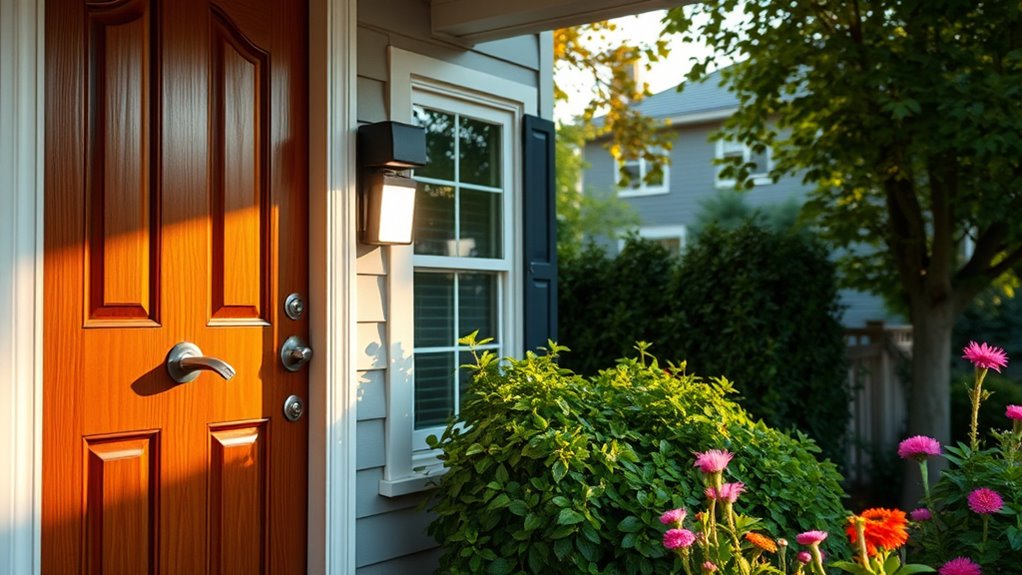To protect your home, start by reinforcing entry points with solid doors, deadbolts, and secure windows. Enhance outdoor safety with motion sensor lights and visible security cameras. Leverage smart technology for remote monitoring and automated alerts. Join neighborhood watch programs to foster community awareness. Don’t forget regular maintenance and fire safety checks to keep everything in top shape. By implementing these strategies, you’ll create a secure environment. Find out more ways to boost your home’s safety further.
Key Takeaways
- Reinforce entry points with solid doors, deadbolts, and secure window locks to deter intruders effectively.
- Enhance outdoor safety with motion sensor lights and visible security cameras to discourage criminal activity.
- Implement smart technology like smart locks and cameras for remote monitoring and alerts on suspicious activity.
- Conduct regular maintenance checks on security features, ensuring all systems are functional and up-to-date.
- Engage with neighbors and participate in community watch programs to foster collective vigilance and awareness.
Securing Entry Points

To effectively secure your home, you must start by reinforcing all entry points.
Begin with your doors; choose solid wood or metal options at least one-and-three-quarters inches thick and guarantee they fit snugly in their frames. Install dead bolt locks on every external door, as they offer better protection than standard key-in-the-knob locks.
Start with solid wood or metal doors, at least one-and-three-quarters inches thick, and secure them with dead bolt locks for optimal protection.
Don’t forget to reinforce door frames and strike plates with heavy-duty materials, using 3-inch screws for added security against kick-in attacks.
For sliding doors, use commercial-grade locks or a dowel in the track to prevent unauthorized access.
Finally, equip all windows with key locks and consider adding pin locks for double-hung windows, so they can’t be easily opened from outside.
Enhancing Outdoor Safety
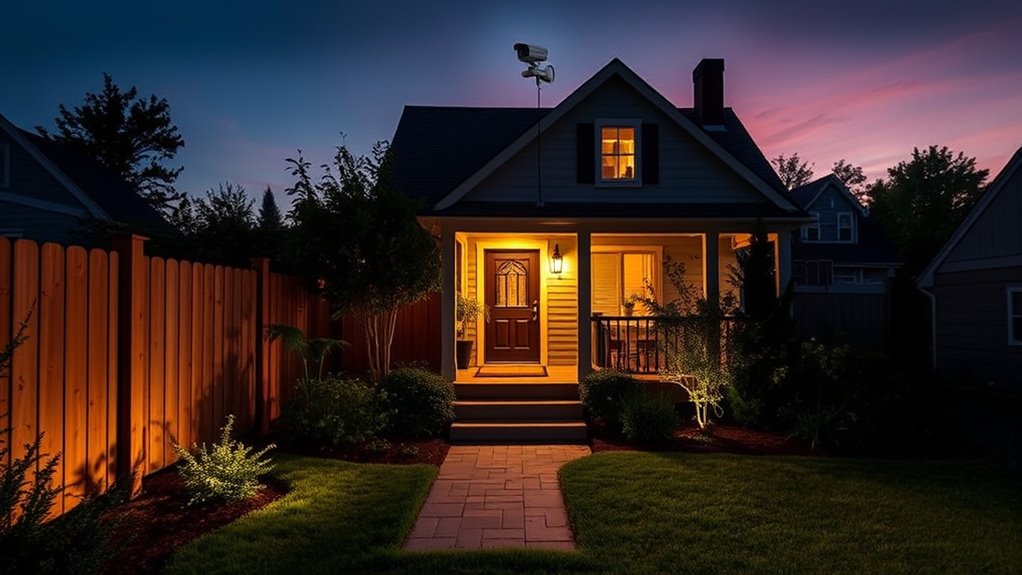
To enhance outdoor safety, you should focus on strategic lighting placement and securing entry points.
Installing motion detector lights around your home can deter intruders by illuminating dark areas. Additionally, regularly check locks and gates to verify they’re secure, creating a strong first line of defense. Consider integrating your outdoor lighting with smart home devices to further enhance security and convenience. Furthermore, investing in best exterior home security cameras can provide real-time monitoring and help you keep an eye on your property from anywhere. The presence of security systems can significantly deter potential burglars and enhance your overall safety.
Strategic Lighting Placement
How can you make your home safer with the right lighting? Strategic lighting plays an essential role in enhancing outdoor safety. Installing outdoor motion detector lights at entry points guarantees that any movement triggers illumination, making it hard for intruders to approach unnoticed. Flood lights near driveways and well-lit outdoor spaces reduce hiding spots, while maintaining clear visibility. Additionally, setting indoor lights on timers simulates occupancy, deterring potential burglars. Don’t forget to display security camera signs alongside your lighting to further discourage crime.
| Lighting Type | Purpose | Benefits |
|---|---|---|
| Outdoor Motion Detector | Detects movement at entry points | Illuminates potential threats |
| Flood Lights | Enhances visibility | Reduces hiding spots |
| Timed Indoor Lights | Simulates occupancy | Deters intruders |
Secure Entry Points
While you may invest in high-tech security systems, the most effective line of defense often lies in securing your entry points.
Focus on enhancing the safety of your doors and windows to deter intruders. Here are some key strategies:
- Install deadbolt locks on all exterior doors.
- Reinforce strike plates for added strength against forced entry.
- Secure sliding glass doors with durable locks or security bars.
- Use key locks and pin locks on all windows.
- Install motion detector lights to illuminate dark areas around your home.
Implementing Smart Technology
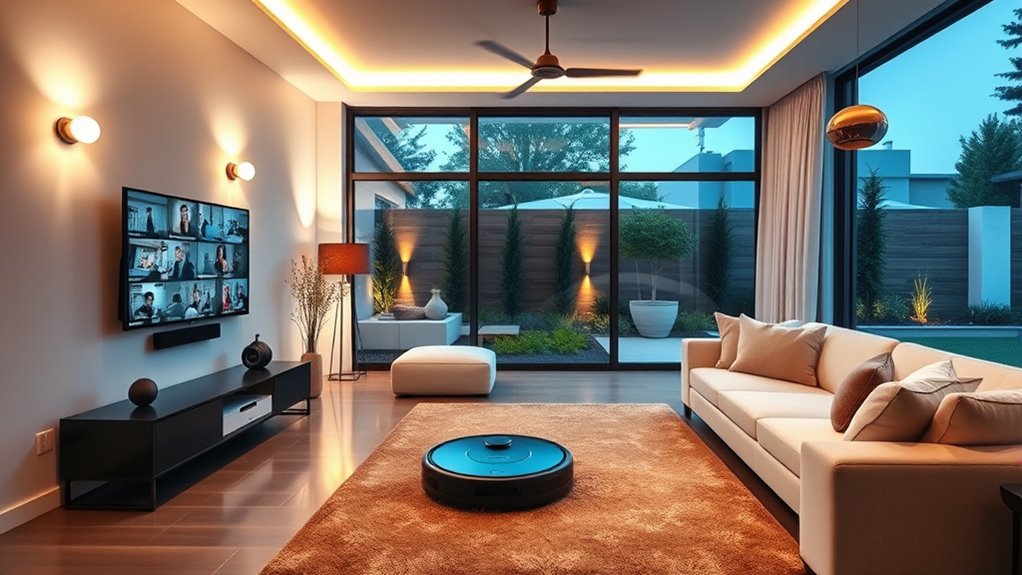
Have you considered how smart technology can elevate your home security? Implementing smart locks allows you to control access remotely, providing enhanced security with keyless entry and temporary access codes for guests.
Smart security cameras, like the Blink wireless system, alert you to unusual activity via built-in motion sensors and integrate seamlessly with home automation systems such as Amazon Alexa.
Smart security cameras with motion sensors, like Blink, provide real-time alerts and integrate effortlessly with home automation systems such as Amazon Alexa.
Additionally, smart lighting systems can be programmed to simulate occupancy, automatically turning lights on and off, which deters potential intruders.
Using a smart home hub, you can achieve centralized monitoring, managing alarms and cameras through one interface.
Don’t forget to regularly update passwords and security settings to prevent unauthorized access and keep your systems effective.
Strengthening Community Awareness

Getting to know your neighbors can considerably boost your home’s security.
When you build these connections, you’re more likely to report any suspicious activity and keep an eye on each other’s properties.
Strong community ties not only enhance safety but also foster a sense of belonging. Additionally, participating in local clubs can provide further opportunities to strengthen neighborhood relationships and promote collective vigilance.
Building Neighborly Connections
Building strong relationships with your neighbors not only enhances community security but also fosters a sense of belonging.
When you know the familiar faces around you, you’re more likely to report suspicious activities and keep an eye on each other’s homes. Joining or creating a neighborhood watch program can be a fantastic way to collaborate and share information about potential threats.
- Engage in regular communication about travel plans.
- Attend community events or social gatherings.
- Offer help or check in on each other regularly.
- Organize neighborhood clean-ups or safety workshops.
- Share resources and tips on monitoring local safety.
These actions create a network of trust, leading to quicker responses to suspicious events and a safer living environment for everyone.
Reporting Suspicious Activity
How can you tell when something’s not quite right in your neighborhood? Developing local awareness is key. Familiarize yourself with your neighbors and engage in a neighborhood watch program to boost community security.
When you know who belongs in your area, you’re more likely to notice and report suspicious activity. Remember, about 60% of burglaries are committed by someone nearby, so staying vigilant acts as a powerful crime deterrent. Additionally, being aware of family and elderly support services in your area can help residents feel more connected and secure.
Regularly communicate with neighbors about travel plans and schedules to foster accountability; this way, you can keep an eye on each other’s homes. Reporting any unusual behavior to the police or your neighborhood watch can lead to faster responses, ultimately strengthening community safety and giving everyone peace of mind. Additionally, consider investing in best garage door openers to enhance your home security measures.
Regular Maintenance and Inspections
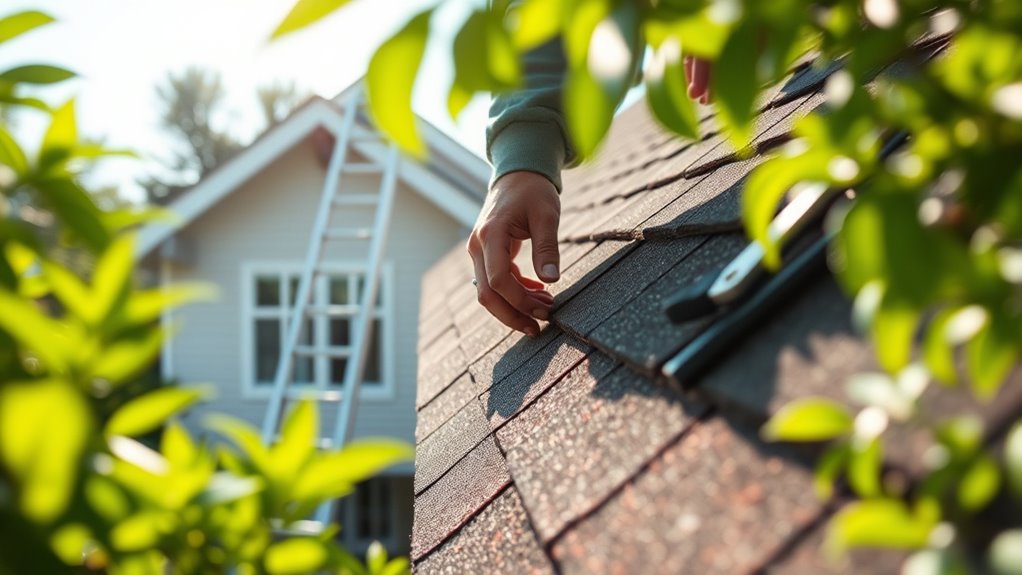
While it might seem tedious, regular maintenance and inspections are essential for keeping your home secure and functional.
By staying proactive, you can deter potential intruders and guarantee everything operates smoothly.
Here are key areas to focus on:
- Inspect door locks and windows quarterly for wear and tear.
- Schedule routine maintenance for your home security system, testing alarms and cameras.
- Check exterior lights seasonally to verify motion sensors and fixtures are operational.
- Regularly assess landscaping to eliminate hiding spots that could shelter intruders.
- Inspect smoke detectors and replace batteries at least once a year for safety.
Additionally, consider the impact of lighting control on your home’s security, as well-lit areas can deter unwanted activity.
These simple steps can greatly enhance your home’s security and give you peace of mind.
Fire Safety Considerations
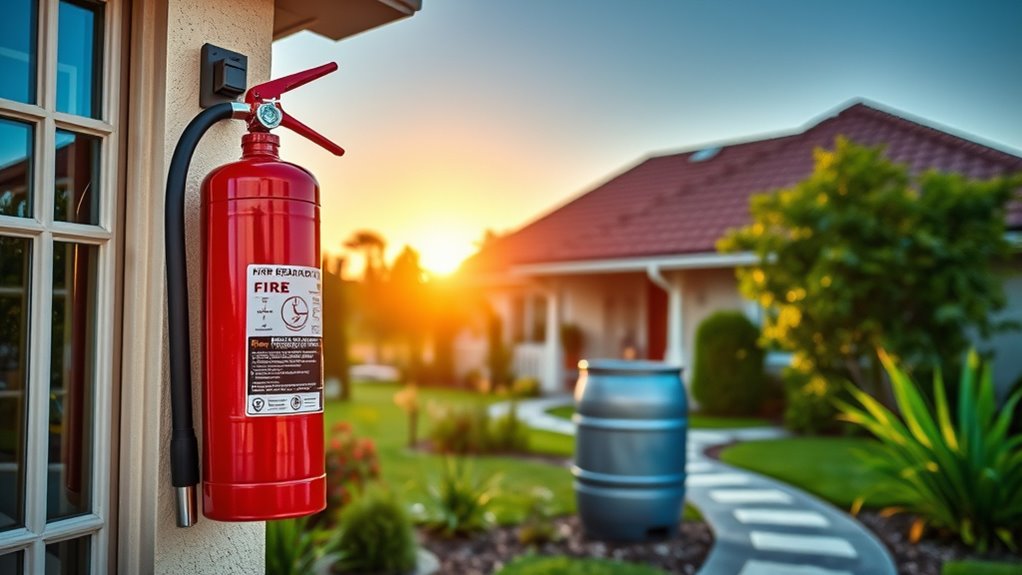
Fire safety is essential for every homeowner, as it can mean the difference between life and death in an emergency.
Install smoke detectors on every level of your home and test them monthly to guarantee they work. These devices considerably increase your chances of survival during a fire.
Keep fire extinguishers in accessible areas, like kitchens and garages, and check them regularly for functionality.
Develop a fire escape plan with your household, ensuring everyone knows multiple exit routes and a meeting point outside.
Regularly inspect your electrical systems to prevent fire hazards from faulty wiring or outdated appliances.
Insurance Benefits of Home Security Measures
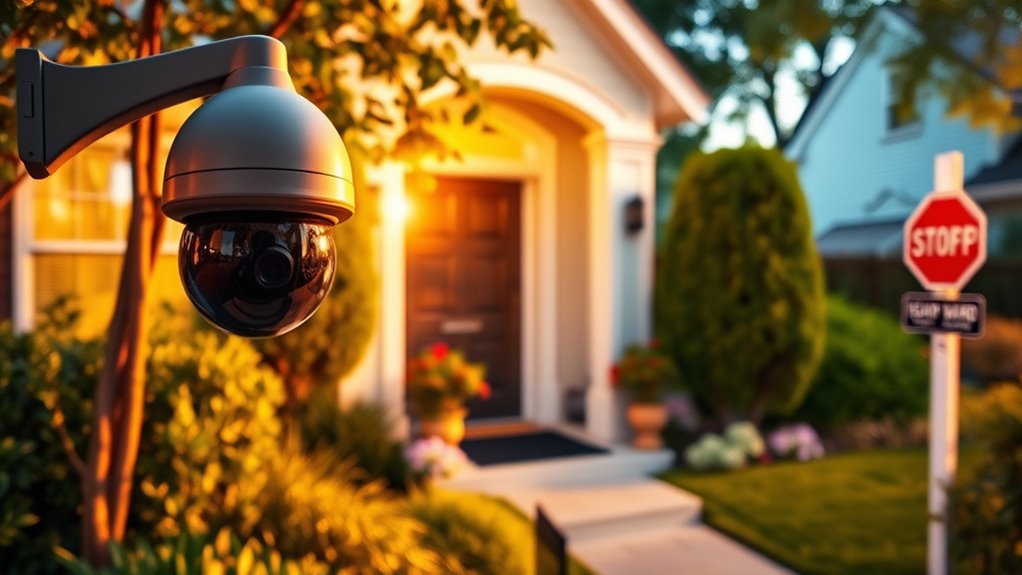
Home safety measures extend beyond just fire prevention; they also play a significant role in your insurance costs.
By enhancing your home security, you can access potential savings on your homeowners insurance. Here are some security tips to evaluate:
Enhancing home security can lead to significant savings on homeowners insurance premiums.
- Install a monitored security system to alert authorities.
- Use dead-bolt locks for added protection.
- Implement a burglar alarm to deter break-ins.
- Regularly maintain your security features for continued discounts.
- Check with insurance companies for specific discount offerings.
Homes equipped with security systems are less likely to be burglarized, which not only protects your property but can also lead to lower premiums and fewer insurance claims over time. Additionally, investing in anti-allergen technology may further enhance your home’s safety by improving air quality and reducing allergens. Permanent loss of hearing can also be a concern, so ensuring a secure environment can help prevent accidents that lead to such conditions. Moreover, a Bitcoin IRA can provide financial security and diversification for your future, similar to how home security protects your property. Investing in efficient payment solutions can also streamline your financial management, offering peace of mind in your overall security. Furthermore, implementing financial safety measures can protect your assets and enhance your overall home security strategy.
Investing in home security is financially advantageous and wise.
Frequently Asked Questions
How to Keep Your Home Safe From Intruders?
To keep your home safe from intruders, start by reinforcing entry points with sturdy deadbolt locks and security bars on sliding doors.
Install motion detector lights around your property to deter potential burglars. A monitored alarm system can greatly lower the risk of break-ins.
Keep your landscaping tidy to eliminate hiding spots, and engage with your neighbors through community programs to foster vigilance.
Taking these steps can enhance your home’s security effectively.
What Is the Best Way to Keep Your House Safe?
Your house is your fortress, a sanctuary that deserves protection. To keep it safe, start with solid locks on doors and windows; think of them as the armor that shields your domain.
Install a monitored security system—it’s your watchful guardian. Illuminate dark corners with motion sensor lights, banishing shadows where intruders lurk.
Join forces with neighbors, building a vigilant community. Regularly check all security features; maintenance guarantees your fortress remains strong and secure.
What Is the Best Way to Secure a Safe in Your Home?
To secure a safe in your home, start by selecting a fireproof and waterproof model.
Anchor it to a concrete floor or wall with high-quality bolts to deter thieves.
Choose a digital lock or biometric access for added security, and regularly update your access codes.
You might also consider using a decoy safe to mislead potential burglars, placing it in an obvious spot while keeping your more secure safe hidden away.
What Is the Best Way to Secure a House?
Securing your house is like building a fortress; every layer counts.
Start by reinforcing exterior doors with solid materials and deadbolt locks. Install motion detector lights and security cameras to keep intruders at bay.
Don’t forget to secure windows with laminated glass and reliable locks. Regularly check all locks, and consider a monitored alarm system.
With these steps, you’ll not only deter potential threats but also gain peace of mind in your sanctuary.
Conclusion
By taking proactive steps to secure your home, you’re not just protecting your space; you’re also enhancing your peace of mind. Did you know that homes without security systems are 300% more likely to be broken into? Investing in the right measures—like securing entry points and embracing smart technology—can greatly lower your risk. So, take the time to assess your home’s safety and make those upgrades. You deserve to feel safe in your own sanctuary!
